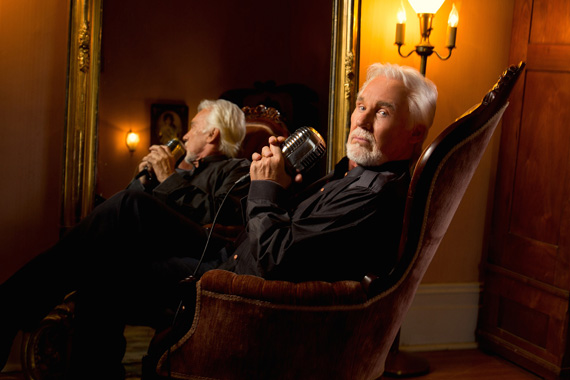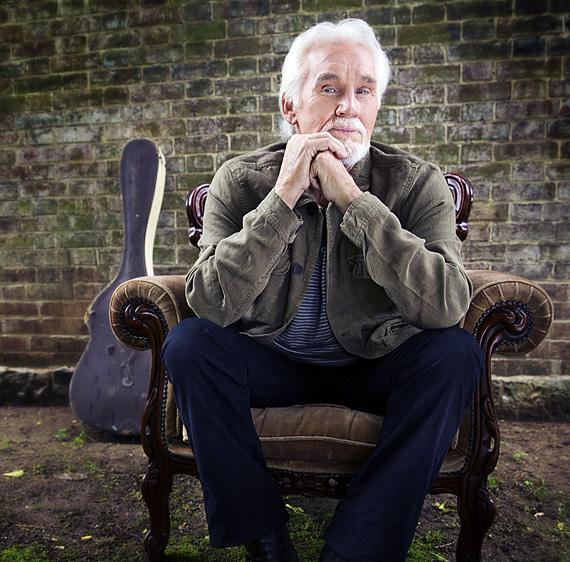

Nearly 40 years after landing his first No. 1 country hit, Kenny Rogers may have retirement on his mind, but he’s not hanging it up just yet. The Country Music Hall of Fame member has confirmed dates stretching through November, including a few in Europe and Asia. More dates of The Gambler’s Last Deal Tour are expected to follow in 2017.
During a brief break from the road, Rogers invited MusicRow publisher/owner Sherod Robertson to sit down for a casual visit about a magnificent career.
MusicRow: Last September, you announced your retirement. How did you come to that decision and then break the news to your team members?
Kenny Rogers: The band was a little shocked. They knew it was coming they just didn’t know when and I didn’t really know when. I just woke up one morning and I said, “I think it’s time to announce because I know it takes about a year to put one of these tours together.”
That’s the one thing I’m going to miss the most is my band. They are my friends. They’ve been with me for over 40 years. They are good guys. I’ve seen them have children and raise their children, get the kids off to college. That’ll be something that will really be missed, is my relationship with them.
You know, I realized that I’m 77 years old. I don’t know how many more years I have. I mean, if you take my blood work, I’m 20 years old, but my body’s falling apart. So, it’s just one of those things that I wanted to make sure I did before I died. And then if I make it through, I want to spend time with my boys. I have 11-year-old identical twins. I may regret that. [laughs] I may go home and say, “Never mind, put me back on the road.”
Let’s fast forward to when the tour is over. What are you going to do the first day of true retirement?
Sleep all day long. [laughs] But seriously, I think it’s really tough to say because I had the first three months off this year because I had pneumonia. And I was a basket case. I was looking for something to do around the house and [my wife] Wanda said, “Why don’t you go somewhere? You’ll feel better if you just go somewhere.” But [retirement] is two years from now because it’s a two-year tour, 55 days this year, and 55 next year. And I think I’ll be physically ready to stop at that point. I always said I would do this until I either embarrassed myself, or couldn’t do it, and I think I’m getting close to both of them.
Is the tour a career retrospective?
It’s a totally different show than they’ve ever seen me do. And it’s really fun for me. It’s kind of a linear look at my career, starting with the 1950s when I was with a group in high school called The Scholars. We sang doo-wop and we were not scholars by any stretch of the imagination. It was a great time though. It was so pure and so innocent. We did it because we heard all the guys that sang with groups got the girls. Wasn’t true, but we heard that.
And from there I got into a jazz group. I’d always played guitar and the guy, Bobby Doyle, was blind. He played piano and did the vocal charts. He said, “I want you to come play upright bass in my band.” I said, “Bobby, I don’t even play bass, I play guitar.” And he said, “There’s one thing I can assure you. There’s more demand for bad bass players than bad guitar players.”
So he said, “I’ll teach you to play bass.” And he literally taught me to play bass and he was blind. And you know, the older I get, the better I used to be, but I think that I became an exceptional bass player and we had an exceptional group. I mean, so many people used to come in and sing with us. We did an after-hours show in Houston, and they used to come in and sing with us. It was such a thrill and I felt like if I never went anywhere else I was happy with that.
You mentioned that you’ve been performing since high school. Was there a point when you realized that you weren’t playing and singing just for fun—that this could become a successful career? What was that moment like?
I think it was all opportunistic. When I joined Bobby Doyle and the jazz group, Bobby had very strict work ethics. We rehearsed three, four hours every day. We played six or seven hours every night, and we got better quickly, and I think that was exciting. And it’s like everything I’ve done throughout my career. I was accused of trying to change country music into something else and I said, “Guys, I was just trying to be successful.” I was trying to find my niche in this business. And I think that’s always been my thing. It’s never been about the money. It’s been about the satisfaction I get from doing something.
I am an impulsive obsessive. I impulsively get involved with something and then I obsess with it to see how good I can get at it. You know, I played tennis for eight years, and eight hours a day, and I got a national ranking in doubles. Then I realized I couldn’t do that anymore, so I started taking up photography lessons, and I was given a certificate of degree of professional photographer by the Professional Photographers Association, a master’s degree.
What do you think motivated you to pursue such heights?
I was raised in the projects in Houston and my dad was an alcoholic. He was a funny alcoholic. He wasn’t bad, he didn’t do anything. He stayed with my mom till they both died, so it wasn’t bad. It was just that I wanted to do something more with my life.
I’m always amazed by what people will do for someone they like, and what they won’t do for someone they don’t like. So, I chose to be that person that hopefully everybody liked, and everybody would help me and it’s been that way. I mean, people have helped me through moments, and I don’t forget it. I appreciate it. And I’ve tried to help other people through those moments.
 Speaking of help, who inspired you along the way and helped you reach this level of success?
Speaking of help, who inspired you along the way and helped you reach this level of success?
I went with my sister and her boyfriend, who my mom didn’t like, when I was 12 years old to hear Ray Charles. He’s the one that made me say, “That’s what I want to do.” Didn’t even know I could sing, and it inspired me. People laughed at everything he said, clapped for everything he sang.
And then there was a group called The Kirby Stone Four. Kirby Stone came down to Texas and he heard our jazz group. He hired us to play for him as his band, and then he let us do 15 minutes of his show. And he really saw something in me that even I didn’t see.
I’m telling you, I wrote my book and I wanted to name it after what he told me. He said, “Kenny, this business is not all wet towels and naked women.” Boy, was I disappointed. [laughs] He said, “No, it’s a business and you have to treat it like a business. If you don’t, it’ll eat you up.” So, I never drank, never smoked, never did drugs, and I’ve always been conscious of surviving. That’s what I think motivated me…. I believe that people are successful because someone they trust believes in them, and they don’t want to disappoint them. I didn’t want to disappoint Kirby.
That makes sense. Have you always been hands-on with your business decisions?
No, I try to hire good people and let them do their job. [On the other hand,] Dolly is a part of everything she does.
Yes, every artist approaches it differently.
I kind of wish I were more like that. My wife gets so mad at me, because she’ll say, “Well, what about this?” I say, “I don’t know.” And I don’t know, and I don’t care. Money doesn’t drive me. That’s never been the driving force with me. And I can’t even say success is what drives me. It’s just enjoying life drives me.
You just mentioned Dolly, so I’d love to ask what she has meant to you in the big scope of your career.
Well, she’s one of the first people that I got involved with in doing duets, and she’s an incredible person to start with, an incredible singer. She came out on the road, and we worked together about 15 years, and we flirted with each other for 30 years, and we never broke that boundary.
That’s where the tension comes. The minute you do something, you break that boundary, so we just intentionally didn’t do that. And she is one of the sweetest people and smartest people. She said, “You know, I have the body of a woman and the mind of a man.” And she does, she thinks like men should think. I just don’t think that way, you know.
Your career has spanned over five decades and with each decade a new crop of fans discover your music. So, is there a song that best represents your career or that you would want them to listen to first?
It’s interesting. I had so many, I don’t know where to start. Maybe “Islands in the Stream” because it’s so happy and it’s so up. It’s really two people who care about each other, and they’re singing about being happy. And that’s kind of where I am mentally. I’d like for people to remember the songs that reflect me and my attitudes more than anything else, more than the success of the song.
If you could do it all over again, is there anything you would change?
Probably not. I have a theory that the longer it takes you to reach your pinnacle, the longer your glide going down. If you go straight up, you’ve got to come straight down. And so with me, I’ve been fortunate enough to build a slow ascent and I reached the top, and now I’m starting down, and I’m okay with that.
I’ve had everything music can offer and there’s a point where you get selfish. I don’t need any more than that. My sons, they’re funny. My older boy said, “Dad, you’ve got to keep going, you can do this, you can do it.” I said, “I don’t need to do this, I don’t need to do that, I’ve done it.”
But it’s been a great life, and I think it’s because money never drove me. That’s where it gets dangerous. And I just love what I’m doing, and I think that’s what keeps you going.
For information on tour dates and tickets, visit kennyrogers.com.

About the Author
Sherod Robertson is President and Owner of MusicRow Enterprises. He oversees all operations and develops strategic initiatives for MusicRow magazine, RowFax, and MusicRow's CountryBreakout chart. Robertson previously served as Director of Finance of Arista Records after beginning his career as Vice President of Finance and CFO at Reunion Records.View Author Profile


